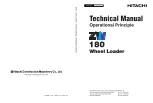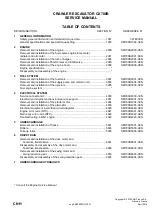
1 – 20
ᵏ
SAFETY
LIFT COORDINATOR
One person should assume responsibility for
coordinating all facets of the lift. He must take
into consideration the operator, the machine,
other personnel. bystanders and the
surrounding area. He must be totally alert to
the hazards involved, have in-depth
knowledge of proper procedures and
exercise good common sense all time.
DO NOT OVERLOAD LIFTING.
Prominent among the safety measures
unique to hydraulic excavators is the sole
reliance upon the manufacturer’s load rating
chart as a guide to lifting capacity. Relying
upon signs of tipping to warn of overload can
result is machine damage or personal injury.
Lifting capacity in excavators is usually
determined by hydraulic and structural
fitness, not tipping load. Before making a list,
ALWAYS
consult the load rating chart in the
operator’s cab.
Stay within the lifting limits when laying pipes.
Remember, you may be able to lift the pipe
close in at ground level, but as you reach out
and down, the lifting capacity decrease. If the
machine is not on level ground. an instability
will result, which could cause tipping. always
use short slings to prevent excessive load
swing.
There may be some local government
regulations regarding the use of excavators
to lift heavy objects. Please observe those
regulations where they apply.
CHECK THE SLING CABLE AND DEVICES.
ALWAYS
be certain that slings, ties and
hooks are properly placed, secure, of
adequate capacity and good condition before
lifting materials
CAUTION









































